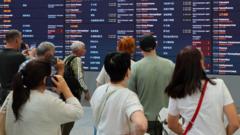Following a fleeting third round of ceasefire talks in Istanbul, drone assaults from both Ukraine and Russia led to fatalities and damage in both nations. While the talks yielded no significant agreements, diplomatic efforts continue as the conflict enters its fourth year.
Escalating Tensions: Drone Strikes Continue Amid Stalled Ceasefire Talks

Escalating Tensions: Drone Strikes Continue Amid Stalled Ceasefire Talks
Ukraine and Russia blame each other for recent drone attacks that resulted in civilian casualties, following a brief and unproductive round of ceasefire discussions in Istanbul.
Russian and Ukrainian forces have engaged in a series of drone strikes that have resulted in multiple casualties, perpetuating the cycle of violence as recent ceasefire discussions take a disheartening turn. Hours after a third round of peace talks took place in Istanbul, two individuals in Russia and three in Ukraine were reported dead due to the ongoing strikes.
In Ukraine's eastern Kharkiv region, authorities stated that three bodies were discovered in the aftermath of missile attacks, with numerous other casualties reported in cities like Cherkasy and Zaporizhzhia. The attacks caused significant damage to Odesa's historic Pryvoz market, and other infrastructure, including a UNESCO-listed central avenue, with several fires igniting in the city.
Conversely, Russian officials confirmed that an overnight Ukrainian drone strike in Sochi resulted in the deaths of two individuals and injuries to 11 others. In a further escalation, a subsequent Russian strike on Kharkiv left an additional 33 individuals wounded.
The ceasefire talks on Wednesday evening lasted less than an hour, with both sides expressing skepticism regarding the likelihood of achieving any substantial progress. Russian chief negotiator Vladimir Medinsky announced the proposal to exchange 1,200 prisoners of war and an offer to return 3,000 deceased Ukrainian soldiers. However, no concrete measures were agreed upon to cease hostilities.
Kremlin spokesman Dmitry Peskov remarked that expectations for a significant breakthrough were unrealistic and emphasized the need for preliminary work before any high-level discussions could be considered. Ukrainian delegate Rustem Umerov underscored the urgency for a meeting between Presidents Vladimir Putin and Volodymyr Zelensky, although Peskov dismissed this notion as "premature."
Earlier rounds of ceasefire discussions had been instigated by former U.S. President Donald Trump, who had previously contended that a swift resolution was achievable within a 50-day timeframe. Should this deadline pass without an agreeable solution, Trump hinted at severe economic consequences for Russia.
Russia continues to adhere strictly to its stipulations for peace, seeking the removal of fundamental causes of the conflict, such as Ukraine's NATO aspirations and military presence. These demands, however, are staunchly opposed by Ukraine and its Western allies.
President Zelensky reiterated his commitment to making diplomatic avenues work, stressing that the onus rests on Russia to conclude the conflict it initiated. As the situation remains fluid, the prospects for peace continue to diminish amid ongoing violence and mutual accusations between the warring nations.



















